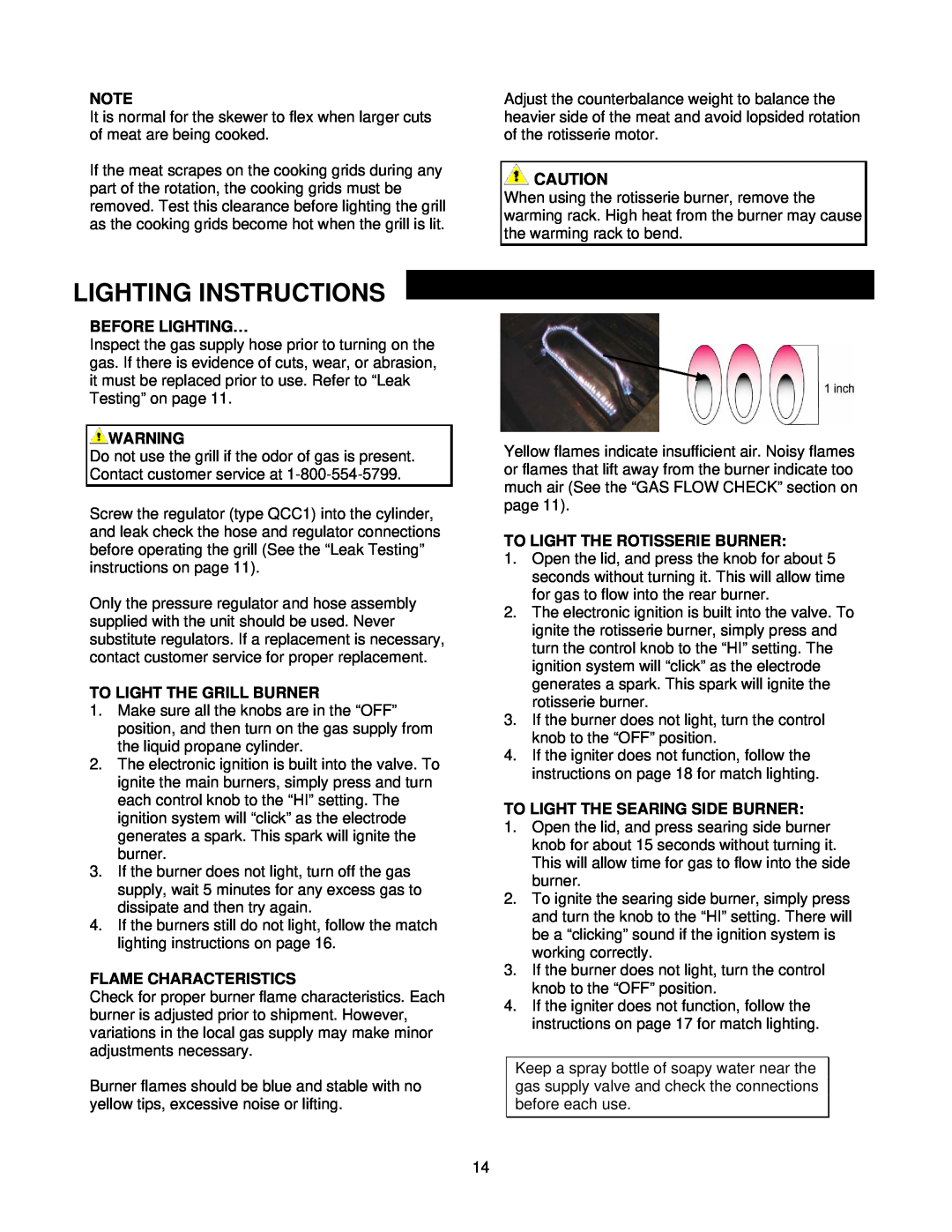
NOTE
It is normal for the skewer to flex when larger cuts of meat are being cooked.
If the meat scrapes on the cooking grids during any part of the rotation, the cooking grids must be removed. Test this clearance before lighting the grill as the cooking grids become hot when the grill is lit.
Adjust the counterbalance weight to balance the heavier side of the meat and avoid lopsided rotation of the rotisserie motor.
![]() CAUTION
CAUTION
When using the rotisserie burner, remove the warming rack. High heat from the burner may cause the warming rack to bend.
LIGHTING INSTRUCTIONS
BEFORE LIGHTING…
Inspect the gas supply hose prior to turning on the gas. If there is evidence of cuts, wear, or abrasion, it must be replaced prior to use. Refer to “Leak Testing” on page 11.
![]() WARNING
WARNING
Do not use the grill if the odor of gas is present. Contact customer service at
Screw the regulator (type QCC1) into the cylinder, and leak check the hose and regulator connections before operating the grill (See the “Leak Testing” instructions on page 11).
Only the pressure regulator and hose assembly supplied with the unit should be used. Never substitute regulators. If a replacement is necessary, contact customer service for proper replacement.
TO LIGHT THE GRILL BURNER
1.Make sure all the knobs are in the “OFF” position, and then turn on the gas supply from the liquid propane cylinder.
2.The electronic ignition is built into the valve. To ignite the main burners, simply press and turn each control knob to the “HI” setting. The ignition system will “click” as the electrode generates a spark. This spark will ignite the burner.
3.If the burner does not light, turn off the gas supply, wait 5 minutes for any excess gas to dissipate and then try again.
4.If the burners still do not light, follow the match lighting instructions on page 16.
FLAME CHARACTERISTICS
Check for proper burner flame characteristics. Each burner is adjusted prior to shipment. However, variations in the local gas supply may make minor adjustments necessary.
Burner flames should be blue and stable with no yellow tips, excessive noise or lifting.
Yellow flames indicate insufficient air. Noisy flames or flames that lift away from the burner indicate too much air (See the “GAS FLOW CHECK” section on page 11).
TO LIGHT THE ROTISSERIE BURNER:
1.Open the lid, and press the knob for about 5 seconds without turning it. This will allow time for gas to flow into the rear burner.
2.The electronic ignition is built into the valve. To ignite the rotisserie burner, simply press and turn the control knob to the “HI” setting. The ignition system will “click” as the electrode generates a spark. This spark will ignite the rotisserie burner.
3.If the burner does not light, turn the control knob to the “OFF” position.
4.If the igniter does not function, follow the instructions on page 18 for match lighting.
TO LIGHT THE SEARING SIDE BURNER:
1.Open the lid, and press searing side burner knob for about 15 seconds without turning it. This will allow time for gas to flow into the side burner.
2.To ignite the searing side burner, simply press and turn the knob to the “HI” setting. There will be a “clicking” sound if the ignition system is working correctly.
3.If the burner does not light, turn the control knob to the “OFF” position.
4.If the igniter does not function, follow the instructions on page 17 for match lighting.
Keep a spray bottle of soapy water near the gas supply valve and check the connections before each use.
14
